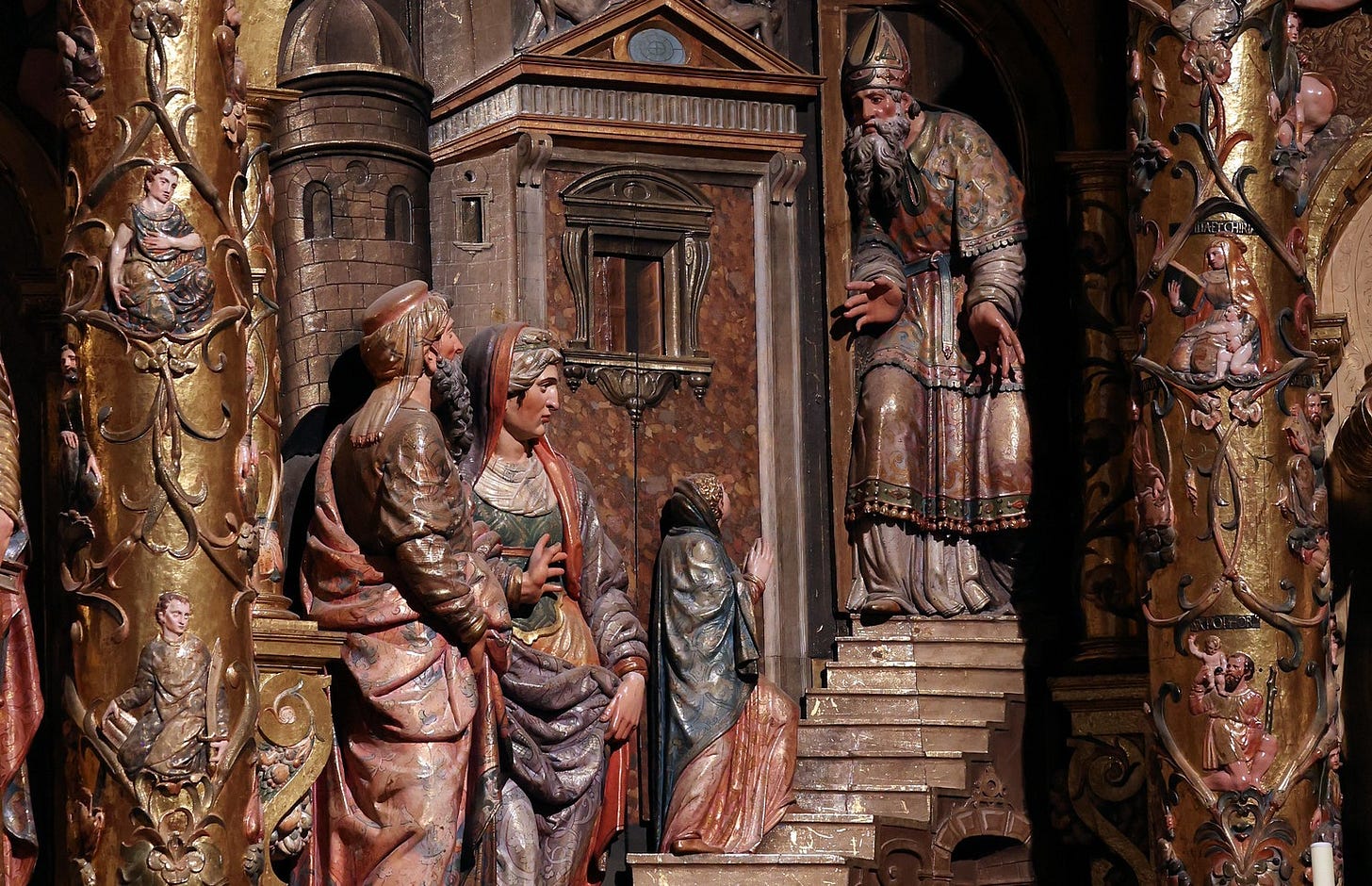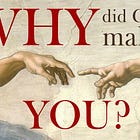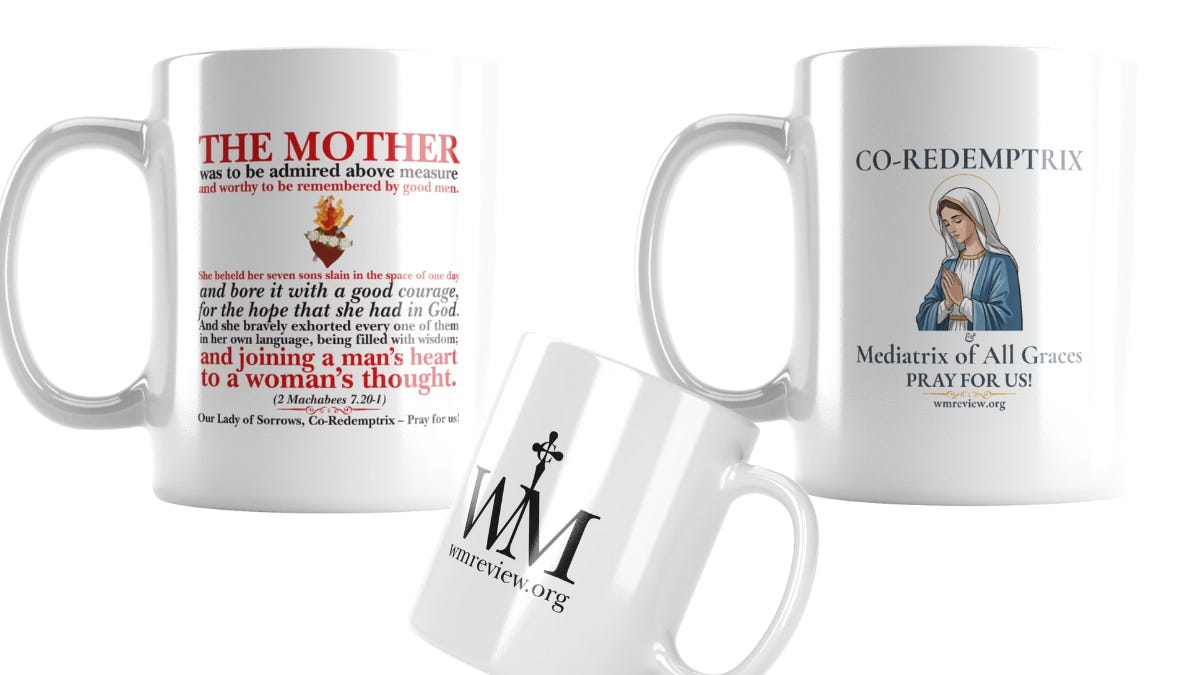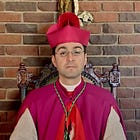Treatise on True Devotion – Introduction
The first part of St Louis de Montfort's Treatise on True Devotion to the Blessed Virgin Mary

Why would someone consecrate themselves as a slave to the Blessed Virgin Mary, according to St Louis de Montfort’s spiritual method?
Editors’ Notes
The WM Review began a communal preparation for the St Louis de Montfort consecration to Our Lady on Christmas Eve, coinciding with Advent.
To supplement this, we are serialising supplementary readings from St Louis de Montfort’s work on the topic. However, readers should not overload themselves with readings, prayers and so on.
Our effort started on Friday 21 November, but feel free to join at any time. Try to catch up if you can – St Louis says the period can be lengthened or shortened according to necessity. You can start here:
Sign up to emails/notifications if you would like to receive the daily meditations, and more:
We advise readers to buy St Louis de Montfort’s book as soon as possible and read it themselves:
Baronius Press edition (Baronius Press)
Baronius Press edition (Amazon)
Treatise on True Devotion to the Blessed Virgin Mary
St Louis de Montfort
Translated by Fr Frederick Faber
Introduction
1. IT IS by the most holy Virgin Mary that Jesus has come into the world, and it is also by her that He has to reign in the world.
2. Mary has been singularly hidden during her life. It is on this account that the Holy Ghost and the Church call her alma Mater—Mother secret and hidden. Her humility was so profound that she had no propensity on earth more powerful or more unintermitting than that of hiding herself, even from herself, as well as from every other creature, so as to be known to God only.
3. He heard her prayers to Him, when she begged to be hidden, to be humbled, and to be treated as in all respects poor and of no account. He took pleasure in hiding her from all human creatures in her conception, in her birth, in her life, and in her resurrection and assumption. Her parents even did not know her, and the Angels often asked of each other: Quce est ista? Who is that? Because the Most High either hid her from them, or if He revealed anything of her to them, it was nothing compared to what He kept undisclosed.
4. God the Father consented that she should do no miracle, at least no public one, during her life, although He had given her the power. God the Son consented that she should hardly ever speak, though He had communicated His wisdom to her. God the Holy Ghost, though she was His faithful Spouse, consented that His Apostles and Evangelists should speak but very little of her, and no more than was necessary to make Jesus Christ known.
5. Mary is the excellent masterpiece of the Most High, of which He has reserved to Himself both the knowledge and the possession. Mary is the admirable Mother of the Son, who took pleasure in humbling and concealing her during her life, in order to favour her humility, calling her by the name of woman (mulier), as if she was a stranger, although in His heart He esteemed and loved her above all angels and all men. Mary is the sealed fountain and the faithful Spouse of the Holy Ghost, to whom He alone has entrance. Mary is the sanctuary and the repose of the Holy Trinity, where God dwells more magnificently and more divinely than in any other place in the universe, without excepting His dwelling between the Cherubim and Seraphim. Neither is it allowed to any creature, no matter how pure, to enter into that sanctuary without a great and special privilege.
6. I say with the Saints, The divine Mary is the terrestrial Paradise of the New Adam, where He is incarnate by the operation of the Holy Ghost, in order to work there incomprehensible marvels. She is the grand and divine World of God, where there are beauties and treasures unspeakable. She is the magnificence of the Most High, where He has hidden, as in her bosom, His only Son, and in Him all that is most excellent and most precious. Oh, what grand and hidden things that mighty God has wrought in this admirable creature! How has she herself been compelled to say it, in spite of her profound humility: Fecit mihi magna, qui potens est! The world knows them not, because it is at once incapable and unworthy of such knowledge.
7. The Saints have said admirable things of this Holy City of God; and, as they themselves avow, they have never been more eloquent and more content than when they have spoken of her. Yet, after all they have said, they cry out that the height of her merits, which she has raised up to the throne of the Divinity, cannot be fully seen; that the breadth of her charity, which is broader than the earth, is in truth immeasurable; that the grandeur of her power, which she exercises even over God Himself, incomprehensible; and finally, that the depth of her humility, and of all her virtues and graces, is an abyss which never can be sounded. O height incomprehensible! O breadth unspeakable! O grandeur immeasurable! O abyss impenetrable!
8. Every day, from one end of the earth to the other, in the highest heights of the heavens and in the profoundest depths of the abysses, everything preaches, everything publishes, the admirable Mary! The nine choirs of Angels, men of all ages, sexes, conditions, and religions, good or bad, nay even the devils themselves, willingly or unwillingly, are compelled, by the force of truth, to call her Blessed. St. Bonaventure tells us that all the Angels in heaven cry out incessantly to her, Sancta, sancta, sancta Maria, Dei Genitrix et Virgo; and that they offer to her millions and millions of times a day the Angelical Salutation, Ave Maria; prostrating themselves before her, and begging of her, in her graciousness, to honour them with some of her commands. St. Michael, as St. Augustine says, although the prince of all the heavenly court, is the most zealous in honouring her and causing her to be honoured, while he waits always in expectation that he may have the honour to go, at her bidding, to render service to some one of her servants.
9. The whole earth is full of her glory, especially among Christians, amongst whom she is taken as the protectress of many kingdoms, provinces, dioceses, and cities. Numbers of cathedrals are consecrated to God under her name. There is not a church without an altar in her honour, not a country or a canton where there are not some miraculous images, where all sorts of evils are cured, and all sorts of good gifts obtained. Who can count the confraternities and congregations in her honour? How many religious orders have been founded in her name and under her protection! What numbers there are of Brothers and Sisters of all these confraternities, and of religious men and women of all these orders, who publish her praises and confess her mercies! There is not a little child, who, as it lisps the Ave Maria, does not praise her. There is scarcely a sinner who, even in his obduracy, has not some spark of confidence in her. Nay the very devils in hell respect her while they fear her.
10. After that we must surely say with the Saints, De Maria nunquam satis; we have not yet praised, exalted, honoured, loved, and served Mary as we ought to do. She has deserved still more praise, still more respect, still more love, and far more service.
11. After that we must say with the Holy Ghost, Omnis gloria filice Regis ab intus—“All the glory of the King’s daughter is within.” It is as if all the outward glory, which heaven and earth rival each other in laying at her feet, is nothing in comparison with that which she receives within from the Creator, and which is not known by creatures, who in their littleness are unable to penetrate the secret of the secrets of the King.
12. After that we must cry out with the Apostle, Nec oculus vidit, nec auris audivit, nec in cor hominis ascendit—“Eye has not seen, nor ear heard, nor man’s heart comprehended,” the beauties, the grandeurs, the excellences, of Mary, the miracle of the miracles of grace, of nature, and of glory. If you wish to comprehend the Mother, says a Saint, comprehend the Son; for she is the worthy Mother of God. Hic taceat omnis lingua, “Here let every tongue be mute.”
13. It is with a particular joy that my heart has dictated what I have just written, in order to show that the divine Mary has been up to this time unknown, and that this is one of the reasons that Jesus Christ is not known as He ought to be. If, then, as is certain, the kingdom of Jesus Christ is to come into the world, it will be but a necessary consequence of the knowledge of the kingdom of the most holy Virgin Mary, who brought Him into the world the first time, and will make His second advent full of splendour.
HELP KEEP THE WM REVIEW ONLINE WITH WM+!
As we expand The WM Review we would like to keep providing free articles for everyone.
Our work takes a lot of time and effort to produce. If you have benefitted from it please do consider supporting us financially.
A subscription gets you access to our exclusive WM+ material, and helps ensure that we can keep writing and sharing free material for all.
You can see what readers are saying over at our Testimonials page.
(We make our WM+ material freely available to clergy, priests and seminarians upon request. Please subscribe and reply to the email if this applies to you.)
Subscribe to WM+ now to make sure you always receive our material. Thank you!
If you enjoyed this article, why not get the mugs?
Read Next:
Follow on Twitter, YouTube and Telegram:



